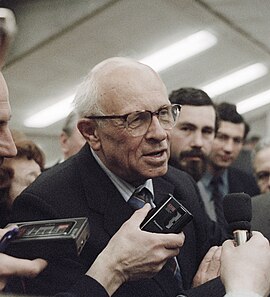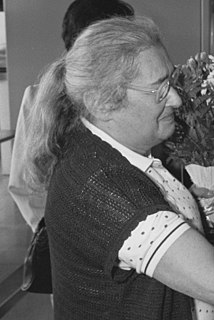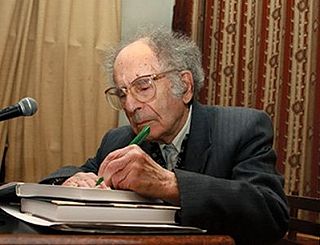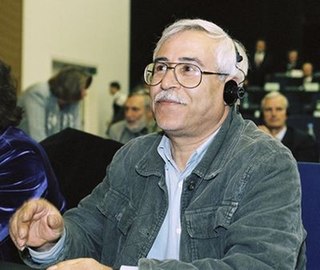
Andrei Dmitrievich Sakharov was a Soviet nuclear physicist, dissident, Nobel laureate and activist for disarmament, peace, and human rights.

Oslobođenje is a daily newspaper in Bosnia and Herzegovina based in the capital city Sarajevo. Founded on 30 August 1943, in the midst of World War II, on a patch of territory liberated by Partisans, in what was otherwise a German-occupied country, the paper gained recognition over the years for its high journalistic standards and is recipient of numerous domestic honors and international awards in a branch.

Yuri Fyodorovich Orlov was a particle accelerator physicist, human rights activist, Soviet dissident, founder of the Moscow Helsinki Group, a founding member of the Soviet Amnesty International group, and Professor of Physics at Cornell University. He was declared a prisoner of conscience while serving nine years in prison and internal exile for monitoring the Helsinki human rights accords as a founder of the human rights movement in the Soviet Union.

The Sakharov Prize for Freedom of Thought, commonly known as the Sakharov Prize, is an honorary award for individuals or groups who have dedicated their lives to the defence of human rights and freedom of thought. Named after Russian scientist and dissident Andrei Sakharov, the prize was established in December 1988 by the European Parliament.
Sakharov is a Russian surname, derived from the word "сахар" (sugar). Other spellings of the surname are Saharov / Saharova, Sakharoff, Saharoff.

Yelena Georgiyevna Bonner was a human rights activist in the former Soviet Union and wife of the physicist Andrei Sakharov. During her decades as a dissident, Bonner was noted for her characteristic blunt honesty and courage.
The Prix mondial Cino Del Duca is an international literary award. With an award amount of €200,000, it is among the richest literary prizes.
Herman Feshbach was an American physicist. He was an Institute Professor Emeritus of physics at MIT. Feshbach is best known for Feshbach resonance and for writing, with Philip M. Morse, Methods of Theoretical Physics.
The Andrei Sakharov Prize is a prize that is to be awarded every second year by the American Physical Society since 2006. The recipients are chosen for "outstanding leadership and/or achievements of scientists in upholding human rights". The prize is named after Andrei Sakharov (1921-1989), Soviet nuclear physicist, dissident and human rights activist; since 2007 it has been valued at $10,000.
Andrey, Andrej or Andrei is a form of Andreas/Ἀνδρέας in Slavic languages and Romanian. People with the name include:
The Andrei Sakharov Prize for Writer's Civic Courage (1990–2007) was an annual literary prize established in the Soviet Union by the "Writers in Support of Perestroika" association, in October 1990. It ceased to exist in 2007, when the "Aprel" sssociation was dissolved.

Grigory Solomonovich Pomerants was a Russian philosopher and cultural theorist. He is the author of numerous philosophical works that circulated in samizdat and made an impact on the liberal intelligentsia in the 1960s and 1970s.

Izzat Ghazzawi was a Palestinian writer born in Deir al-Ghusun in Tulkarm Governorate. He wrote about the sufferings of the Palestinian people and was arrested many times by Israeli authorities for "political activities". He was a professor at Birzeit University and was awarded the Sakharov Prize for freedom of thought in 2001.

Naum Natanovich Meiman was a Soviet mathematician, and dissident. He is known for his work in complex analysis, partial differential equations, and mathematical physics, as well as for his dissident activity, in particular, for being a member of the Moscow Helsinki Group.

Razan Zaitouneh is a Syrian human rights lawyer and civil society activist. Actively involved in the Syrian uprising, she went into hiding after being accused by the government of being a foreign agent and her husband was arrested. Zaitouneh has documented human rights in Syria for the Local Coordination Committees of Syria. Zaitouneh was kidnapped on 9 December 2013, most likely by Jaysh al-Islam. Her fate remains unknown. It is suspected that she has been killed.

Mulugeta Bekele is an Ethiopian scientist and academic. He is an associate Professor of Physics at Addis Ababa University (AAU), Ethiopia. He completed his PhD in Physics at the Indian Institute of Science, Bangalore, India in 1997. He has been awarded the Andrei Sakharov Prize by the American Physical Society (APS) "For tireless efforts in defense of human rights and freedom of expression and education anywhere in the world, and for inspiring students, colleagues and others to do the same." He is the president of Ethiopian Physical Society since October 1998 and an Associate Member of the Abdus Salam International Centre for Theoretical Physics, Trieste, Italy since May 1999.

Leyla Islam qizi Yunusova, better known as Leyla Yunus, is an Azerbaijani human rights activist who serves as the director of Institute of Peace and Democracy, a human rights organisation. She is particularly known for her work helping citizens affected by forced evictions in Baku, on whose behalf she organized several small protests. In July 2014, the Azerbaijani authorities jailed Yunus under allegations of fraud and tax evasion, which are charges widely regarded as dubious. After being sentenced to 8.5 years in jail on 13 August 2015, Leyla Yunus was released on grounds of her deteriorating health on 9 December 2015, with a court converting her sentence into a suspended one.

Rasul Jafarov is a lawyer and prominent human rights defender in Azerbaijan.
The Andrei Sakharov Freedom Award, officially known as the Sakharov Freedom Award and named after Soviet scientist and dissident Andrei Sakharov, was established in 1980 by the Norwegian Helsinki Committee with the support and consent of Andrei Sakharov himself, to help people who, because of their opinions, beliefs, and conscience are persecuted or imprisoned. The fund's assets are to be used for direct support to those persecuted in their home country, mainly by granting the Sakharov Freedom Award.











